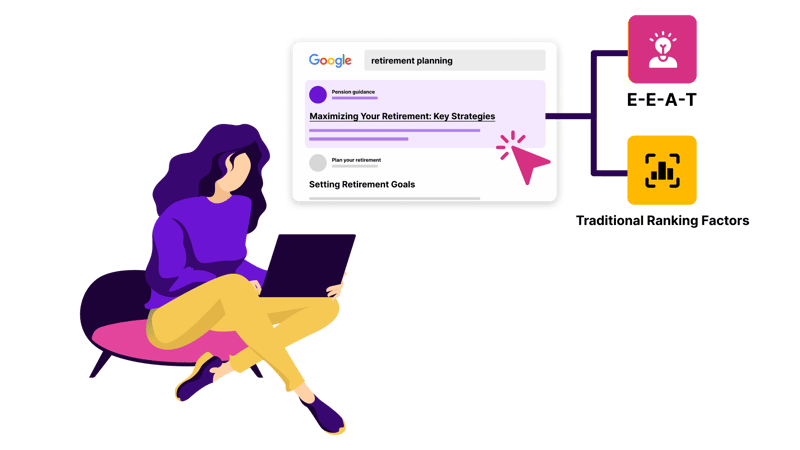Every website should run SEO tests. But it's even more crucial for Your Money or Your Life (YMYL) websites. That’s because Google monitors them more closely than other sites, meaning it’s even harder to make SEO decisions based on assumptions. How so?
Well, in recent years, Google has been tackling the spread of misinformation and disinformation in search results. One approach has been to hold websites that have the potential to impact a user’s life to a higher standard than others.
Google refers to these web pages as Your Money or Your Life (YMYL). They encompass topics like legal advice, financial support, and health or medical information. If users receive unreliable, inaccurate, or unsafe content when searching these topics on Google, they could make poor or dangerous decisions.
To try and prevent this, the search engine giant developed E-A-T, or Expertise, Authoritativeness, and Trustworthiness as a guide to the kinds of content they want to see succeed. More recently, it’s added ‘Experience’ into the mix and now refers to the concept as E-E-A-T. Google uses this idea to assess content quality, particularly concerning YMYL topics.
But ranking well as a YMYL website isn’t as simple as writing well-researched content. The interplay between E-A-T factors and more traditional ranking factors makes predicting what will work for these sites incredibly hard. And that’s why you need real SEO A/B test data.
YMYL websites need data, not assumptions
So, why is it so hard to guess what will help a YMYL website rank well? Simply put, SEO isn’t a checklist any more. The devil is in the detail and the subtleties make all the difference:
- E-E-A-T features are not the same as Google’s standard ranking factors. So, SEO experts need to step away from what they know and instead test how certain changes to your website impact E-E-A-T features. Things like missing author attributions, unclear website ownership, or the absence of particular policies, for example, may not get flagged as an SEO issue. But Google will absolutely scrutinize you for these errors when it comes to E-E-A-T.
- We’ve learned that Google uses more human interaction measurements than we once thought. Usage data, like click-through rate (CTR), dwell time, and bounce rate, can potentially directly influence a website’s search engine results page (SERP) position. With this in mind, SEO specialists need to take human behavior into consideration when it comes to testing. The problem is, humans are unpredictable. So, when optimizing for E-E-A-T, you need to treat it more like a Conversion Rate Optimization (CRO) or User Experience (UX) assessment. Don’t assume you know what works - test your hypotheses on real-life users, analyse and learn from the data.
- We can’t and shouldn’t take Google’s statements at face value. The platform wants us to think that E-E-A-T factors are the most important thing for websites to focus on because they want to shape the web in a certain way. It is up to us to check that our efforts are working and that we are covering all other ranking factors, too.
[For more insight like this, sign up for our weekly live talks here. ]
SearchPilot: Running SEO experiments for YMYL websites
At SearchPilot, several of our clients operate in the YMYL space. (It helps that we’re ISO 27001 certified. We’re HIPAA and PCI compliant. And we regularly pass security reviews from our enterprise customers.
One of our case studies tested whether dynamic or static prices perform better in a website’s title tag in SERPs. We found that including a static price in the title and meta description actually hurt SEO. However, we saw a positive impact when we modified the title tag to include dynamic prices. The change led to a 10% uplift in organic traffic.
Think of the test result in the context of Google’s E-E-A-T and it is easy to see why providing the most up-to-date information in title tags would lead to better results. The data is more trustworthy. Plus, it creates a better user experience because the information is consistent. In turn, Google concludes that a site with dynamic prices is more reliable than one with a static price.
This is only one factor that influences how much traffic your YMYL website receives. SearchPilot’s SEO split tests enable you to run experiments that get seen by real users — and provide accurate insight into how changes impact your website’s performance.
Want to find out how SearchPilot can help you achieve SEO success with accurate A/B testing? Speak to a team member today.
